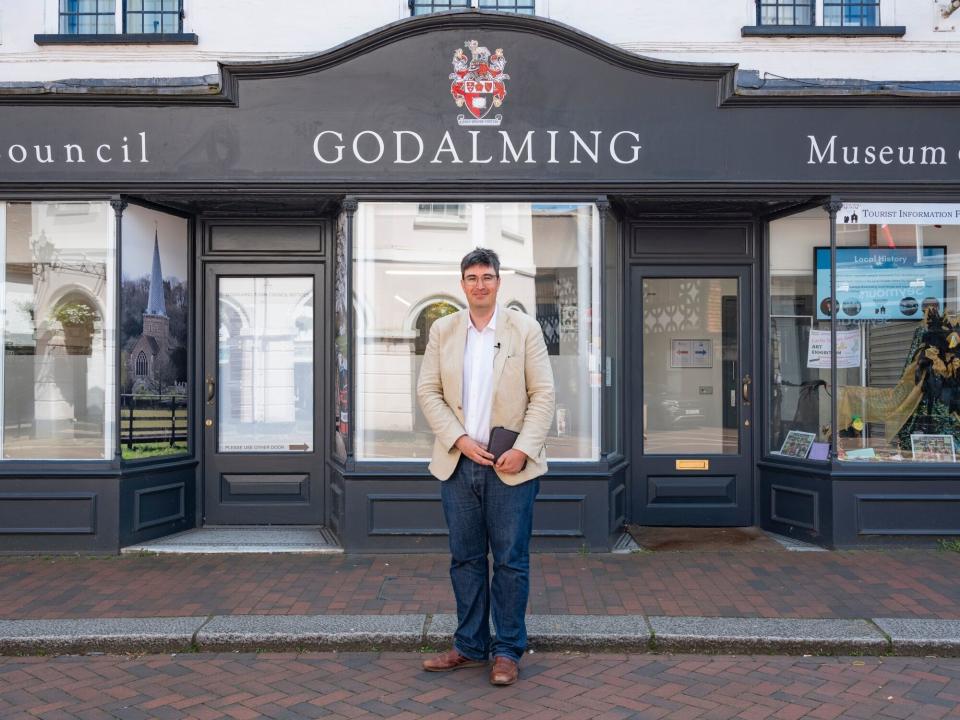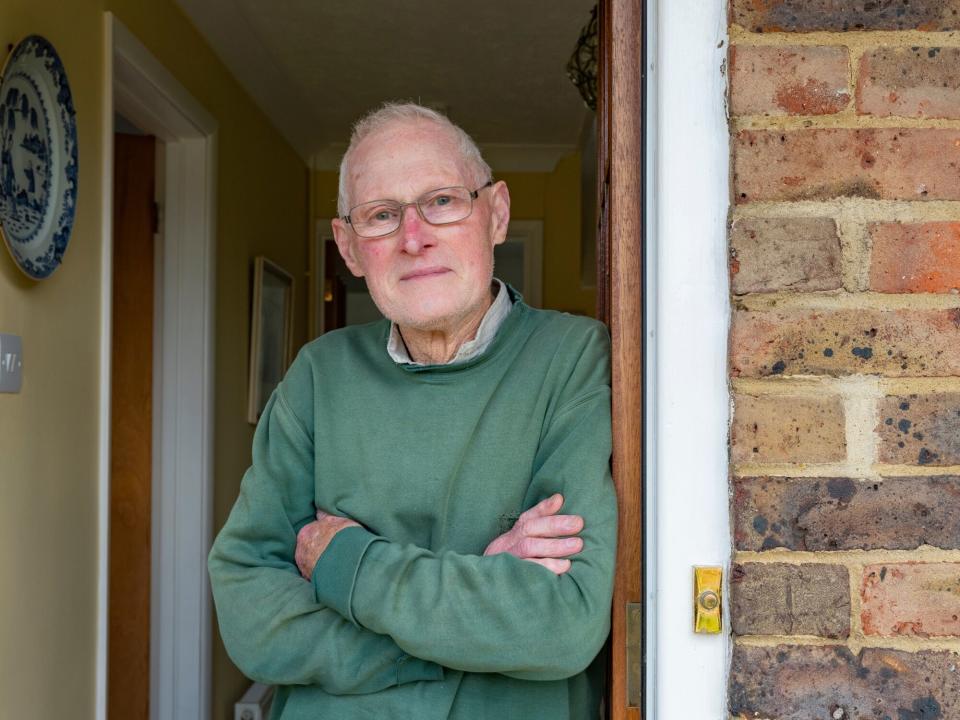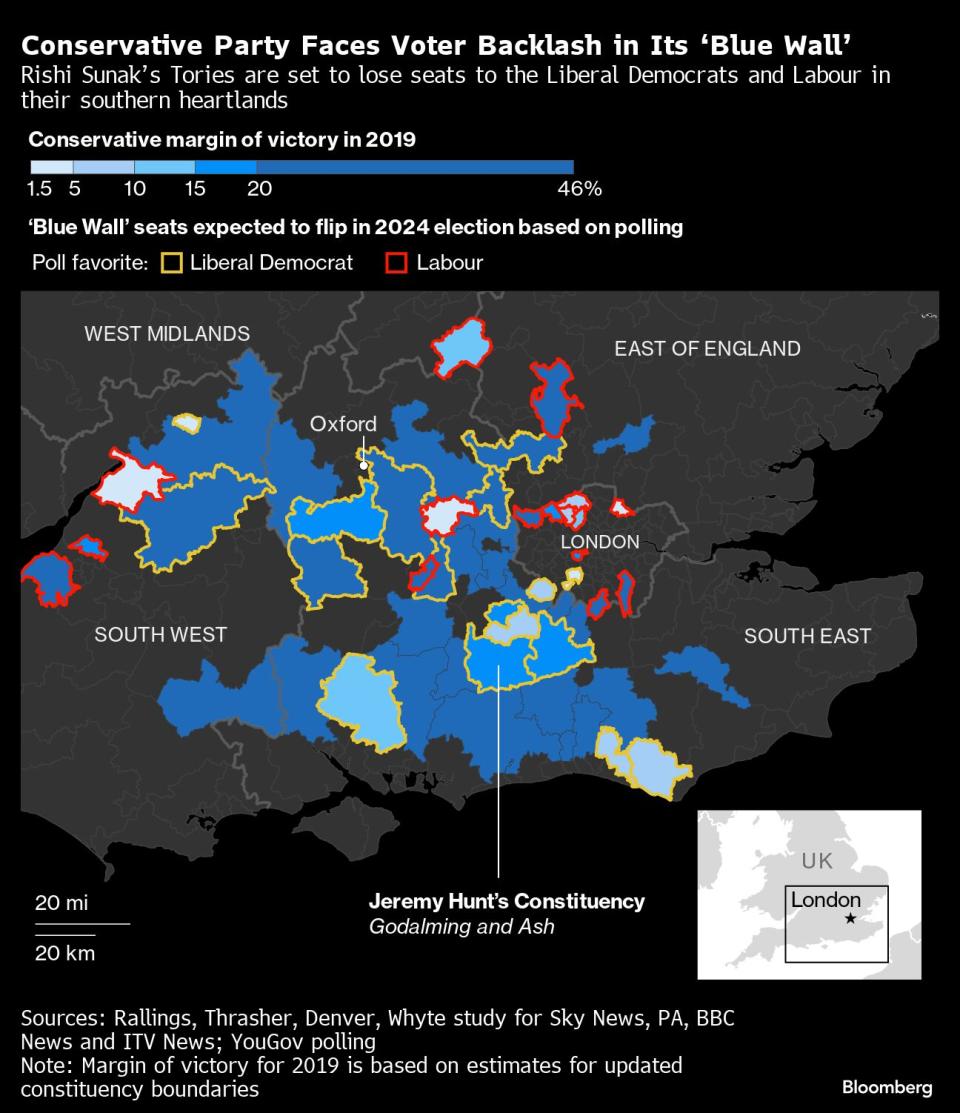Jeremy Hunt Admits He's 1,500 Votes Away From Historic Defeat
(Bloomberg) -- Jeremy Hunt is very much on home turf in the quaint English village of Chiddingfold, with its obligatory cricket pitch and gardens in bloom. Yet weeks out from a UK election, Britain’s finance minister also seems out of place, campaigning for hours on end for desperately-needed local votes.
Most Read from Bloomberg
Hunter Biden Was Convicted. His Dad’s Reaction Was Remarkable.
US Inflation Broadly Cools in Encouraging Sign for Fed Officials
Fed Officials Dial Back Rate Forecasts, Signal Just One ‘24 Cut
Stock Bull Run Breaks Record on Fed Decision Day: Markets Wrap
Blinken Casts Doubt on Cease-Fire Hopes After Hamas Responds
“It must be a sign of the times,” said Ben Fielden, moments after Hunt had knocked on the 82-year-old’s front door for a chat and to hand over a campaign leaflet. “I’ve never seen Jeremy here before. The whole of the Conservative Party are fairly worried about things, as they probably should be.”
Fielden is a life-long Conservative voter and will back them again on July 4, even though he expects the party to be kicked out of power for the first time since 2010. But leaning on his doorway, the semi-retired hairdresser said he also predicts Hunt — who by this time was several houses down the road — will no longer be in Parliament representing this quiet corner of rural Surrey.
No Chancellor of the Exchequer has lost their seat in a general election, according to House of Commons data going back to 1906, making his fight for survival one of the main plot lines of a vote that polls suggest Keir Starmer’s Labour Party will win easily next month.
A Hunt defeat would surpass the infamous “Portillo moment” in modern British political history, and just as when then Tory cabinet minister Michael Portillo lost in the Tony Blair-inspired Labour landslide in 1997, it would become synonymous with the dramatic end of another Conservative era.
But while the top line of the UK general election is all but certain to be about Labour ending 14 years in opposition, Hunt’s battle is anchored in whether defeat for the Tories becomes a whitewash. According to YouGov modeling, the centrist Liberal Democrats are on course to win Hunt’s seat and across swathes of the so-called Blue Wall, a band of 55 Tory districts in southern and southeast England that in normal times would be solidly Conservative territory.
Of the 55 constituencies in the Blue Wall, identified using YouGov and Bloomberg calculations, the pollster’s modeling suggests 16 will fall to the Liberal Democrats, and 17 to Labour.
“There’s all to play for,” Hunt told Bloomberg in Chiddingfold, part of the new Godalming and Ash parliamentary district that takes in much of the South West Surrey area he has represented since 2005. “This seat is probably going to be won or lost by the Conservatives by 1,500 votes or fewer.”
In his black trainers, jeans, navy shirt and suit jacket, Hunt the candidate should be pitch perfect for Surrey, a county with a reputation for wealth that currently has 10 Tory MPs. He was a staunch Remainer in the 2016 Brexit referendum and is seen as a sensible chancellor, brought in to repair the turmoil triggered by ex-premier Liz Truss. As a backbencher during the pandemic, he criticized the chaos and indecision of Boris Johnson’s government.
But Hunt’s struggles in Godalming and Ash — he had a winning margin of 15 percentage points in South West Surrey in 2019 — underscore how much the Tories have moved politically, under Johnson, Truss and now under Rishi Sunak.
The Blue Wall seats were opposed to Britain leaving the European Union almost a decade ago. Many like Goldalming and Ash incorporate commuter towns growing on London’s periphery, which have a higher-than-average proportion of graduates and are getting younger and more liberal.
Those traits have clashed with the Tory direction in recent years. Hunt at times appears an awkward front man for controversial government policies like deporting asylum seekers to Rwanda and stoking right-wing “culture wars,” and those positions have made himself increasingly out of sync with his district.
“They’ve made such a shambolic mess of so many things,” Robert Ellis, 58, said in Godalming town center this week. The self-employed management consultant backed Hunt in 2010, 2015 and 2017 but switched to the Liberal Democrats in 2019 and is considering voting for them again, he said, citing Brexit, Johnson and Sunak’s Rwanda plan. “I would actually be embarrassed to say I’m going to vote Conservative, because of what’s happened.”
Across the UK, the election theme is fundamentally about change. The word is plastered across Labour’s campaign bus, and Starmer’s party is tapping into deep dissatisfaction with the state of public services and the cost-of-living crisis. In a way, Sunak is trying to harness the same sentiment, saying the country has turned the corner and urging voters to back the Tories to continue. On Wednesday, the day after Sunak launched the Conservative election manifesto, GDP figures showed the UK economy stagnating, with growth flat in April.
In parts of the Blue Wall, though, it’s the Liberal Democrats in the strongest position to oust the Tories, and a string of recent gains by Ed Davey’s party across local council and special parliamentary elections suggest people are increasingly voting tactically to make that happen.
Liberal Democrat messaging is calibrated for that. Its manifesto promise to boost the National Health Service and properly fund social care is designed to have wide appeal, but other pledges are more localized. In Hunt’s district, residents are angry about sewage pumped by Thames Water Ltd. into the River Wey, so Liberal Democrat candidate Paul Follows campaigns hard on that.
“The fact that this seat is in play at all says a great deal about this election,” said Follows, 38, who works in cybersecurity for BAE Systems Plc and is leader of the local council. Sipping an oat milk flat white in a Godalming coffee shop, Follows said growing hostility to the privatized water industry — 10,000 homes were left without supply for days last year — was part of a wider backlash against the Tories exacerbated by their recent direction.
“We’ve got an MP who thinks privatization is working, despite all of the evidence around him to the contrary,” Follows said. “We have a very intelligent, well-educated electorate here who understand when they’re being gas-lit.”
That’s what 36-year-old Laura Beasley is thinking about ahead of the election. She’s a Labour supporter who’s planning to tactically vote for the Liberal Democrats. “I will do what I can to get Jeremy Hunt out,” said Beasley, who works in recruitment. “I don’t like the guy, I don’t like what he stands for.”
Hunt, meanwhile, has to balance his national persona as chancellor with a near two-decade record as a local MP he hopes will buy him some loyalty. He’s also given £100,000 to the local Tory association to support his re-election bid.
“It’s nice to have a constituency MP you feel is on side,” said Anthea Clarke as she walked her Cocker Spaniel on Godalming high street. Hunt has her vote, the 73-year-old said, before adding: “He’s not going to be a chancellor next time is he? Let’s face it, pigs might fly.”
Still, Hunt is not giving up. In Chiddingfold, he told constituents the government has been creating jobs, and told Bloomberg he hasn’t given any thought to what he might do next if he loses.
“It’s bad feng shui to start planning the life you don’t want to have,” Hunt said. “I’m very committed to the fact this is a democracy. It doesn’t matter who you are – prime minister, chancellor, foreign secretary – you have to get out knocking on the doors.”
--With assistance from Alex Morgan, Eamon Farhat and Dave Merrill.
(Updates with GDP figures in 14th paragraph.)
Most Read from Bloomberg Businessweek
China’s Economic Powerhouse Is Feeling the Brunt of Its Slowdown
The World’s Most Online Male Gymnast Prepares for the Paris Olympics
As Banking Moves Online, Branch Design Takes Cues From Starbucks
Food Companies Hope You Won’t Notice Shortages Are Raising Prices
©2024 Bloomberg L.P.

 Yahoo News
Yahoo News 







